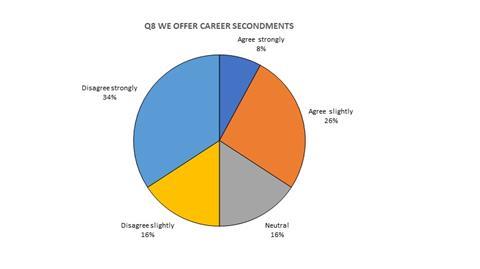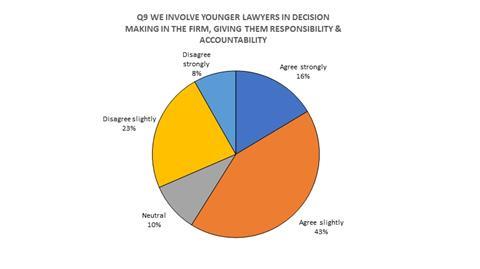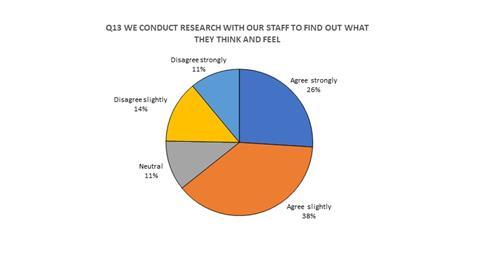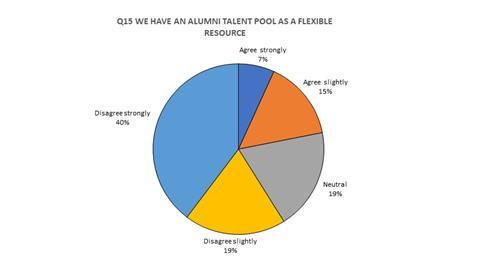Attracting and retaining the right talent is one of the most business-critical issues affecting law firms. In the first of a two-part series, Rachel Brushfield looks at how firms need to rethink their practices in order to successfully attract and retain young talent in fast-changing times.
Generation Y (born between 1979 and 1999) and generation Z (born after 2000) are moving through the ranks in law firms. With more deregulation on the horizon making it easier for solicitors to go freelance, firms need to rethink how they attract and develop talent – or risk losing their staff and competitive advantage.
Below, I share key findings from a questionnaire about talent from my session at the Law Society’s People in Practice conference in March 2019. (Read the conference presentations.)
Keeping staff who are known to perform and who are trusted by clients and staff makes good business, financial and reputational sense
The survey asked attendees what their practice offers in terms of talent definition, employer branding, flexible working, career framework, continuing professional development (CPD), career-enhancing experiences, sabbaticals, secondments, responsibility and accountability, workforce planning, values, involvement in business strategy, staff research, employee referral schemes, and alumni talent pools. The results are based on 72 respondents from small and medium-sized firms across the UK, working as practice managers, senior or managing partners, fee-earning or support staff, or in human resources.
Many firms have embraced flexible working – with 89% of respondents’ firms offering flexible working options to help retain talent. More than 85% encourage staff to invest in their own personal and professional development, while just under 70% have an employee referral scheme to find new talent.
The responses also highlight some potential gaps to consider which may help you improve staff satisfaction and retention in your own firm. Only 14% of respondents agreed strongly that their firm has adopted a modern career development approach and less than 20% agreed strongly that their workforce planning strategy is diverse. Below, I focus on five areas of opportunity for firms to help attract and retain talent:
- sabbaticals
- secondments
- decision-making and responsibility
- staff research
- using an alumni talent pool.
Career sabbaticals
Over 65% of respondents’ firms do not offer career sabbaticals.
Lynda Gratton, professor at London Business School and author of The Shift – the future of work is already here (2011) and The 100-Year Life (2016), predicts that career sabbaticals are going to increase. This will be fuelled by younger generations wanting to travel and enjoy a varied work-life blend, and older generations – with longer life expectancy and working lives – seeking a gentle “slope” to retirement, rather than a “cliff”.
Career sabbaticals are offered by many firms, mostly to equity partners. Stewarts Law introduced a policy for equity partners in 2014, for example.
As well as re-energised lawyers returning to work with new and broader perspectives, the benefits include succession planning. Younger, high-potential lawyers gain increased responsibility and the chance to take stock of department activities – as they review client files, day-to-day management and communication for the handover. Millennials look for fast career progression and early responsibility; offering a sabbatical to a senior partner can open up such opportunities within your firm.
In 2019, Clifford Chance began piloting two months’ unpaid leave for eligible associates and senior associates. Broadening career sabbaticals to associates is likely to become a growing trend and is a useful way for firms to attract and retain talent, especially in high-demand, short-supply niche legal areas.

Career secondments
Secondments can be a useful tool in your firm’s rewards armoury when it comes to attracting talent, as opportunities to gain career-enhancing experiences are a common motivating factor for generations Y and Z. (For more on the different generations in the workplace, see my article ‘The generation game’ for Managing for Success.) However, half of our respondents said that their firm does not offer career secondments.
Offering a proven fee-earner a secondment can be a great way to test their ability, potential and readiness for promotion. Providing such opportunities will help set your firm apart for potential applicants and can help with succession planning too.

Involving younger lawyers in decision-making
Generations Y and Z are keen to get involved in decision-making and hungry for responsibility, yet only 16.4% of respondents strongly agreed that their firm involves younger lawyers in decision-making. With a growing number of career options open to young lawyers, including freelancing, firms who fail to do this are missing a trick and, over time, may experience a talent drain.
If you don’t already have one, an associate board can be a useful way to give younger lawyers responsibility and accountability for certain management and strategy issues. Greater exposure to the senior management team can be a motivating career factor for Generations Y and Z.

Conducting staff research
Discretionary effort from staff can make a huge difference to a firm’s performance.
How people feel about their workplace affects what they do, or don’t do. The ‘psychological contract’ – the unspoken expectation of what staff members receive versus what they give in time and energy – is invisible and hard to quantify, yet easily damaged. Often the first sign that the psychological contract has been damaged is an increase in absence days or when someone hands in their notice, by which time it is too late.
Offering a pay rise to persuade people to stay can provide a short-term fix but does not send out a positive message to others. Conducting research with your staff helps to inform decision-making and create clear priorities in the firm. Nevertheless, nearly a quarter of those surveyed disagreed with the following statement: “We conduct research with our staff to find out what they think and feel”.

Using an alumni talent pool
Generations Y and Z are keen to travel and have diverse careers gaining different experiences. Many aspire to a portfolio career or to run their own business.
In future, resourcing will be much more fluid than it is now. Keeping staff who are known to perform and who are trusted by clients and staff makes good business, financial and reputational sense. One way to do this is through an alumni talent pool – a database of potential job candidates, made up of former employees. Clifford Chance, for example, have 8000 registered alumni across 100 countries, providing a large pool of experienced advisors for periods of high demand.
Setting up an alumni talent pool costs relatively little and offers many benefits, yet only 6.8% of respondents agreed strongly with the statement “we have an alumni talent pool as a flexible resource”, while 58.9% disagreed slightly or strongly.
Benefits include reducing time and money spent on recruitment, and sourcing people who:
- have prior knowledge of your services and processes
- have a proven work ethic
- fit your firm’s culture
- can offer diverse experience from outside the firm.
Management can be outsourced to a specialist company.
You can set up a basic alumni talent pool using an Excel spreadsheet or – even better – an online platform, which will ensure the technology is future-proof and, allow you to compare candidates by various criteria and carry out targeted direct marketing. Communicating with your alumni, via newsletters and events, is vital to keep them engaged and aware of opportunities such as holiday and maternity leave cover.

Conclusions
Many law firms have out-of-date human capital management practices and are missing out when it comes to attracting and retaining younger talent.
As Generations Y and Z move into decision-making roles, failure to make changes in how your firm manages its human capital could be very costly, both financially and in terms of reputation.
Addressing these issues should be in the top-three items on the agenda at partnership meetings. Many of the changes needed are not expensive to carry out but will require time and care to implement. Getting a fresh perspective from outside your firm and looking laterally at other sectors can help you inject best practice and introduce change faster. Law firms need to address these gaps or risk losing opportunities in the long-term.
Part two of this article will look at the causes of talent retention problems.
Rachel Brushfield will be doing an event on talent attraction, development and retention for the Law Management Section in autumn 2019. Email us to register your interest.
About the author
Rachel Brushfield is the Talent Liberator and founder of EnergiseLegal, as well as career, and learning and development strategist and coach. Rachel has supported the Law Society’s returners’ course for over a decade and was a judge in the 2019 Excellence Awards.
Law Management Section members receive a discount on Rachel’s book, Career management for lawyers, using the code LAWMN.
Rachel has also written on topics including:
- staying positive in uncertain times
- the needs of different generations in the workplace
- career choices for senior lawyers.
















